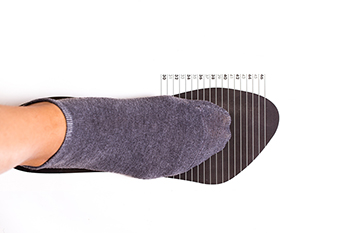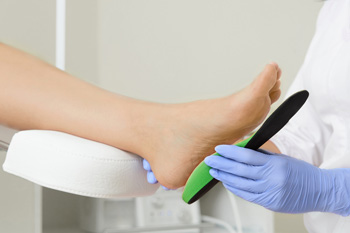Items filtered by date: January 2022
What Do Podiatrists Do?
Podiatrists are medical professionals who diagnose, treat, and offer preventative care for problems that affect the feet, ankles, and lower legs. Podiatrists may treat various foot and ankle injuries, such as plantar fasciitis, ankle sprains, and stress fractures. They can also address foot deformities, such as bunions, and skin or nail conditions like athlete’s foot or fungal toenails. A podiatrist might play a major role in a patient’s care if they have diabetes, poor circulation, or neuropathy, as these conditions frequently affect the feet. Some podiatrists are also trained in surgery. If you have developed a foot or ankle problem, it is suggested that you consult with a podiatrist.
If you are experiencing pain in the feet or ankles, don’t join the stubborn majority refusing treatment. Feel free to contact one of our podiatrists from Toms River Podiatrist . Our doctors can provide the care you need to keep you pain-free and on your feet.
What Is a Podiatrist?
Someone would seek the care of a podiatrist if they have suffered a foot injury or have common foot ailments such as heal spurs, bunions, arch problems, deformities, ingrown toenails, corns, foot and ankle problems, etc.
Podiatric Treatment
A podiatrist will treat the problematic areas of the feet, ankle or lower leg by prescribing the following:
- Physical therapy
- Drugs
- Orthotic inserts or soles
- Surgery on lower extremity fractures
A common podiatric procedure a podiatrist will use is a scanner or force plate which will allow the podiatrist to know the designs of orthotics. Patients are then told to follow a series of tasks to complete the treatment. The computer will scan the foot a see which areas show weight distribution and pressure points. The podiatrist will read the analysis and then determine which treatment plans are available.
If you have any questions please feel free to contact our office located in Toms River, NJ . We offer the newest diagnostic and treatment technologies for all your foot and ankle needs.
Matchmaker, Matchmaker, Make My Foot a Good Match
It is believed that many foot problems are caused by wearing the wrong kind of shoe. Here are some things you can do to help keep your feet healthy by choosing the right kind of shoe for your individual foot. Start by outlining your feet on a piece of paper and bringing that with you when you are buying shoes. Go in the afternoon or evening, after your foot has had a chance to expand throughout the day. When you get to the store, have your foot measured or do it yourself. Be sure to stand up to make sure each foot is measured accurately. If your feet vary in size, choose the larger size. Look for shoes that have good arch support, no rough inner seams, at least 1/2” of space between your longest toe and the tip of the shoe, and a structured back to hug your heel. When you find a shoe you are interested in, check to see if it matches your foot shape before you try it on. Place the shoe on top of the outline you brought: if it covers the outline completely, that means it might be a good match. Try the shoe on and walk around to make sure nothing pinches or rubs your foot. For additional tips on finding shoes that are right for your feet, consult with a podiatrist.
Finding a properly-fitting shoe is important in reducing injuries and preventing foot problems. For more information about treatment, contact one of our podiatrists from Toms River Podiatrist . Our doctors will treat your foot and ankle needs.
Proper Shoe Fitting
A common concern when it comes to foot health, having properly fitted shoes can help prevent injuries to the foot. Out feet affect our posture and gait, which in turn affects the biomechanics and overall bodily structure. With 33 joints, 26 bones, and over 100 ligaments, the potential for serious injury is much greater than one realizes. Although the feet cease growth in adulthood, they still change shape as they mature. Here are some factors to consider when it comes to investing in proper fitting shoes:
- Be sure the shoes fit correctly right away
- Ensure the ball of your foot fits comfortably in the widest portion of the shoes
- Even though they may look fashionable, improper fitting shoes can either create adverse conditions or exacerbate existing ones you may already have
- Walk along a carpeted surface to ensure the shoes comfortably fit during normal activity
Keeping in mind how shoes fit the biomechanics of your body, properly-fitting shoes are vitally important. Fortunately, it is not difficult to acquire footwear that fits correctly. Be sure to wear shoes that support the overall structure of your body. Do your feet a favor and invest in several pairs of well-fitted shoes today.
If you have any questions please feel free to contact our office located in Toms River, NJ . We offer the newest diagnostic and treatment technologies for all your foot and ankle needs.
See Your Podiatrist Regularly If You Work On Your Feet
Foot Pain and Discomfort During Pregnancy
Pregnancy can often bring on painful swelling in the feet and ankles as well as changes in your gait. The extra weight a woman gains during pregnancy puts pressure on their heels, ankles, and plantar fascia (the long tissue running along the bottom of the feet). This may cause pain in the heel and ankles, and plantar fasciitis (an inflammation of the plantar fascia). This additional weight may also alter a woman’s stride, causing her feet to flatten and roll inward when she walks. Swelling, or edema, is another common condition among pregnant women, and is caused by an excessive production of fluid, blood, and water retention during pregnancy. Also, relaxin is a hormone produced during pregnancy that can loosen and relax the ligaments in feet and ankles, possibly causing discomfort and instability. A podiatrist can help a woman throughout her pregnancy to relieve pain, swelling and discomfort, while helping to correct any gait or alignment issues.
Pregnant women with swollen feet can be treated with a variety of different methods that are readily available. For more information about other cures for swollen feet during pregnancy, consult with one of our podiatrists from Toms River Podiatrist . Our doctors will attend to all of your foot and ankle needs.
What Foot Problems Can Arise During Pregnancy?
One problem that can occur is overpronation, which occurs when the arch of the foot flattens and tends to roll inward. This can cause pain and discomfort in your heels while you’re walking or even just standing up, trying to support your baby.
Another problem is edema, or swelling in the extremities. This often affects the feet during pregnancy but tends to occur in the later stages.
How Can I Keep My Feet Healthy During Pregnancy?
- Wearing orthotics can provide extra support for the feet and help distribute weight evenly
- Minimize the amount of time spent walking barefoot
- Wear shoes with good arch support
- Wear shoes that allow for good circulation to the feet
- Elevate feet if you experience swelling
- Massage your feet
- Get regular, light exercise, such as walking, to promote blood circulation to the feet
If you have any questions please feel free to contact our office located in Toms River, NJ . We offer the newest diagnostic and treatment technologies for all your foot and ankle needs.
How Often Should Orthotics Be Replaced?
Orthotics are inserts placed in your shoes to add cushioning that are often prescribed for people who have plantar fasciitis or other painful foot conditions. They can improve your gait and posture as well as help reduce pain. Orthotics can be made specifically to fit your foot, which increases their efficacy, and are either soft, semi-rigid, or rigid depending on the foot condition being treated. They last different durations based on materials, your weight, and the amount of activity you do. Replacement of orthotics can range from three-to-six months to several years. To help orthotics last longer wipe them with a damp – not wet – cloth, or use spray shoe cleaners. Wearing shoes that fit properly will also add to the lifespan of your orthotics. If you notice that your orthotics are fraying, smell bad, or are worn, they may be doing you more harm than good and probably need to be replaced. Please visit a podiatrist before deciding on which orthotics, inserts, or insoles are best for your feet. And check back with your podiatrist periodically to see if they need to be replaced.
If you are having discomfort in your feet and would like to try orthotics, contact one of our podiatrists from Toms River Podiatrist . Our doctors can provide the care you need to keep you pain-free and on your feet.
What Are Orthotics?
Orthotics are inserts you can place into your shoes to help with a variety of foot problems such as flat feet or foot pain. Orthotics provide relief and comfort for minor foot and heel pain but can’t correct serious biomechanical problems in your feet.
Over-the-Counter Inserts
Orthotics come in a wide variety of over-the-counter inserts that are used to treat foot pain, heel pain, and minor problems. For example, arch supports can be inserted into your shoes to help correct overarched or flat feet, while gel insoles are often used because they provide comfort and relief from foot and heel pain by alleviating pressure.
Prescription Orthotics
If over-the-counter inserts don’t work for you or if you have a more severe foot concern, it is possible to have your podiatrist prescribe custom orthotics. These high-quality inserts are designed to treat problems such as abnormal motion, plantar fasciitis, and severe forms of heel pain. They can even be used to help patients suffering from diabetes by treating foot ulcers and painful calluses and are usually molded to your feet individually, which allows them to provide full support and comfort.
If you are experiencing minor to severe foot or heel pain, it’s recommended to speak with your podiatrist about the possibilities of using orthotics. A podiatrist can determine which type of orthotic is right for you and allow you to take the first steps towards being pain-free.
If you have any questions please contact our office located in Toms River, NJ . We offer the newest diagnostic and treatment technologies for all your foot and ankle needs.





